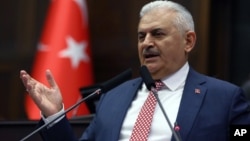Turkey's new prime minister vowed on Tuesday to start work immediately on forging the stronger presidency wanted by Tayyip Erdogan, and announced a Cabinet that signaled policy continuity but left little doubt as to who was in charge.
Key members of the economic management team including Deputy Prime Minister Mehmet Simsek, favored by foreign investors as a reformer, kept their posts in the new government; but around half of the names were reshuffled as Erdogan consolidated his 14-year hold on power.
Addressing parliament, Prime Minister Binali Yildirim said he would seize a "historic opportunity" to change a constitution born of a 1980 army coup. That new basic law would reflect the fact that the president had for the first time been popularly elected, rather than chosen by parliament.
The lira firmed to 2.98 against the dollar after Yildirim announced the cabinet, from below 3.00 beforehand, reflecting investor relief that Simsek, and Finance Minister Naci Agbal, had retained their positions.
The two are advocates of structural reforms to boost Turkey's labor productivity and household savings, which economists say are long overdue.
"Logic prevails – why would Erdogan not keep Simsek, so as to keep markets and investors on side for the time-being," said Nomura strategist Timothy Ash in an e-mailed note, but added:
"This is not to say that Simsek will have that much leverage to deliver on his structural reform plan. The power is moving to Erdogan and his less orthodox policy advisers."
Erdogan favors consumption-led growth and has said high interest rates cause inflation, a stance at odds with orthodox economics. Investors have been unnerved by pressure on the central bank, which cut the top end of its rate corridor for a third month on Tuesday, to push rates down.
Erdogan won Turkey's first presidential election in 2014 having stepped down from the prime minister's post with the intention of imbuing a largely ceremonial presidency with strong powers akin to those of the U.S. and French heads of state.
Opponents fear creeping authoritarianism on the part of Erdogan, who remains by far the most popular politician, aided by a weak and divided opposition that lacks strong leadership.
The nationalist MHP opposition, whose support Erdogan may need to press through changes, said a presidential system would inevitably lead to despotism.
"We need to change the constitution so it matches the de facto situation," Yildirim told a parliamentary meeting of the AK Party. "It's the AK Party's most important duty."
Yildirim rejected suggestions that the president, by chairing a first cabinet meeting, was meddling in government affairs in violation of the current constitution.
His words reflected the confused nature of a system that, while parliamentary in name, is dominated by a single figure, far and away the most popular politician in the NATO country.
Strained EU ties
Yildirim said he would prioritize growth by boosting production, encourage investment and job creation, and maintain fiscal discipline, in a sign of continuity with policies that fueled Turkey's growth during the AKP's first decade in power.
Nihat Zeybekci, a close Erdogan ally, returned as economy minister, a post he had held until last November. Erdogan's son-in-law Berat Albayrak kept his position as energy minister.
Foreign Minister Mevlut Cavusoglu also remained in his job, but former AK Party spokesman Omer Celik became the new EU minister at a critical time in Turkey's relations with Europe.
The two are trying to keep a deal on track which would see Turks gain visa-free travel to Europe in return for Ankara continuing to stem the flow of illegal migrants into Europe.
While the EU is desperate for the deal to succeed, it also insists that Turkey meet 72 criteria, including reining in its broad anti-terror laws. The EU and rights groups say Turkey uses the laws to stifle dissent, while Ankara says it needs sweeping legislation to fight Kurdish insurgents and Islamic State militants who have launched attacks in Turkey.
Cavusoglu warned EU aspirant Turkey could cancel a range of agreements with the EU if it failed to keep to its promises "and this is no threat or bluff".
Erdogan see constitutional change as a guarantee against the fractious coalition politics that hampered Turkeyt in the 1990s.
His opponents, and skeptical Western allies, fear growing authoritarianism. Prosecutors have opened more than 1,800 cases against people for insulting Erdogan since he became president in 2014. Opposition newspapers have been shut and journalists and academics critical of government policies sacked.
European Parliament President Martin Schulz described Erdogan's accumulation of power on Monday as a "breathtaking departure from European values".





